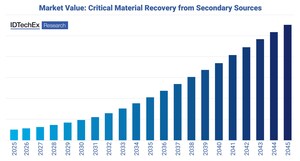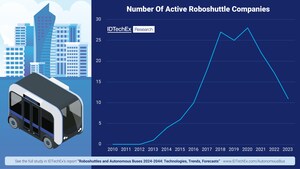BOSTON, May 19, 2023 /PRNewswire/ -- What is packaging for? From its initial purpose of simply protecting the product to driving sales via consumer engagement, the role of packaging has substantially evolved. Smart/intelligent packaging continues this trend towards greater functionality, employing sensors, printed electronics, and wireless communication to add value in novel ways. With applications from logistics labeling to greater consumer engagement IDTechEx's latest report, "Smart Packaging 2023-2033", finds that the market for smart packaging electronics will be worth around US$2.6 billion by 2033. But what are the use cases where smart packaging can best create value?
Parcel Tracking Labels
Condition monitoring and location tracking throughout the logistics chain improves consumer confidence, especially for high-value items or those that may be easily damaged. While these technologies are already deployed at the pallet level using separate devices, smart packaging can enable such tracking at a crate or even an item level.
Technologies such as printed/flexible batteries and sensors enable reduced costs and bulk, enabling the condition of individual deliveries to be tracked. Logistics companies and even insurers can track when/where individual items are being lost, stolen or mistreated, enabling any problems to be dealt with swiftly as well as providing a considerable deterrent effect.
Logistics labeling can also provide value to 'click-and-collect' businesses in which stores serve the same order fulfillment role as distribution centers. Real-time item-level tracking, enabled by smart packaging, can improve the accuracy of the required more complex inventory management systems to enable different parts of the value chain to take on the fulfillment role.
Material Identification for Recycling
Modern recycling processes fall significantly short of what is needed for a true transition to a circular economy. The unfortunate reality is that only approximately 10% of all waste is recycled, largely due to difficulties in sorting materials with extremely similar properties or determining the extent of the contamination.
To address these issues, the European Union is exploring technology solutions based on smart packaging in a project called HolyGrail 2.0. A 'digital watermark', specifically a repeated digital pattern imperceptibly embedded in the regular design, will enable cameras to identify the product and recycling requirements. Unlike a bar code, the 'digital watermark' covers the entire object, so cannot be obscured or damaged. If mandated for all future packaging, a technology such as this would allow recyclers easily sort their waste without needing to rely entirely on the properties of waste materials.
Consumer Engagement
Over the last few years, the COVID-19 pandemic caused a global surge in the adoption of ID technologies, particularly QR codes. The adoption of QR codes into track & trace schemes quickly normalized QR code usage for consumers, triggering many brand owners to investigate smart packaging use cases.
The result is an increased focus on 'connected experience', with brands interacting with consumers on landing sites accessed via smartphone scans of NFC antennas or QR codes. For the consumer, the benefit is in the rewards, such as discounts and freebies exclusive to the landing site. For the environmentally conscientious consumer, information on the sourcing of materials, production process, and carbon impact can also be valuable, accessible knowledge that may influence purchase decisions. For the brand, the connected experience is an excellent tool for collecting customer data and a useful tool in marketing campaigns.
Digitalization of the resale markets is an emerging example of a connected experience. By facilitating an authentication process, smart packaging helps brand owners establish their own marketplaces and maintain control over brand equity after the initial point of sale. For example, eBay has launched the use of NFC authentication for the sneaker marketplace, and Adidas has created Infinite Play with Avery Dennison to establish a trade-in service on their mobile app.
Further Insight
Smart packaging has multiple use cases that can provide benefits across the value chain, from improved consumer interaction to facilitating the transition to a circular economy. To learn more about the opportunities, technological requirements and challenges of many smart packaging applications, IDTechEx's recent report "Smart Packaging 2023-2033" comprehensively explores the topic via a wide range of application case studies and analysis of players, technologies and use cases.
To find out more about this IDTechEx report, including downloadable sample pages, please visit www.IDTechEx.com/smart.
About IDTechEx
IDTechEx guides your strategic business decisions through its Research, Subscription and Consultancy products, helping you profit from emerging technologies. For more information, contact research@IDTechEx.com or visit www.IDTechEx.com.
Images Download:
https://www.dropbox.com/scl/fo/e66dbwvd3egz333cxmmg8/h?dl=0&rlkey=yxleq3klv8u3oahadaxuv1c0f
Media Contact:
Lucy Rogers
Sales and Marketing Administrator
press@IDTechEx.com
+44(0)1223 812300
Social Media Links:
Twitter: www.twitter.com/IDTechEx
LinkedIn: www.linkedin.com/company/IDTechEx
Facebook: www.facebook.com/IDTechExResearch
Poto - https://mma.prnewswire.com/media/2080349/IDTechEx.jpg
Logo - https://mma.prnewswire.com/media/478371/IDTechEx_Logo.jpg







Share this article